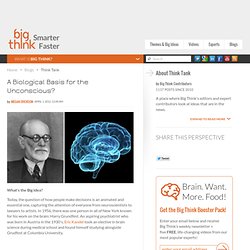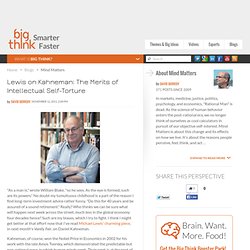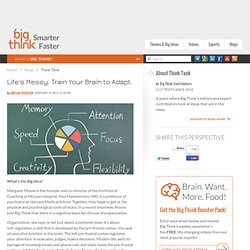

Neurotechnology: BRAIN storm. A mixture of excitement, hope and anxiety made for an electric atmosphere in the crowded hotel ballroom.

On a Monday morning in early May, neuroscientists, physicists and engineers packed the room in Arlington, Virginia, to its 150-person capacity, while hundreds more followed by webcast. Only a month earlier, US President Barack Obama had unveiled the neuroscience equivalent of a Moon shot: a far-reaching programme that could rival Europe's 10-year, €1-billion (US$1.3-billion) Human Brain Project (see page 5). The US Brain Research Through Advancing Innovative Neurotechnologies (BRAIN) Initiative would develop a host of tools to study brain activity, the president promised, and lead to huge breakthroughs in understanding the mind. But Obama's vague announcement on 2 April had left out key details, such as what the initiative's specific goals would be and how it would be implemented. The result was chaotic.
A big picture. Well-connected hemispheres of Einstein's brain may have sparked his brilliance. The left and right hemispheres of Albert Einstein's brain were unusually well connected to each other and may have contributed to his brilliance, according to a new study conducted in part by Florida State University evolutionary anthropologist Dean Falk.

The Perfect Nap: Sleeping Is a Mix of Art and Science. SCIENCE! 101. Salk scientists discover previously unknown requirement for brain development. Public release date: 20-Jun-2013 [ Print | E-mail Share ] [ Close Window ] Contact: Kat Kearneykkearney@salk.edu 619-296-8455Salk Institute Scientists at the Salk Institute for Biological Studies have demonstrated that sensory regions in the brain develop in a fundamentally different way than previously thought, a finding that may yield new insights into visual and neural disorders.

In a paper published June 7, in Science, Salk researcher Dennis O'Leary and his colleagues have shown that genes alone do not determine how the cerebral cortex grows into separate functional areas. Facts about napping. Your brain on improv: Charles Limb on TED.com. The Neurocritic. Brain frontal lobes not sole center of human intelligence, comparative research suggests. May 13, 2013 — Human intelligence cannot be explained by the size of the brain's frontal lobes, say researchers.

Research into the comparative size of the frontal lobes in humans and other species has determined that they are not -- as previously thought -- disproportionately enlarged relative to other areas of the brain, according to the most accurate and conclusive study of this area of the brain. It concludes that the size of our frontal lobes cannot solely account for humans' superior cognitive abilities. The study by Durham and Reading universities suggests that supposedly more 'primitive' areas, such as the cerebellum, were equally important in the expansion of the human brain.
These areas may therefore play unexpectedly important roles in human cognition and its disorders, such as autism and dyslexia, say the researchers. Get Smarter: A Powerful Brain-Boosting Supplement You've Never Heard Of. A Biological Basis for the Unconscious? What's the Big Idea?

Today, the question of how people make decisions is an animated and essential one, capturing the attention of everyone from neuroscientists to lawyers to artists. In 1956, there was one person in all of New York known for his work on the brain: Harry Grundfest. An aspiring psychiatrist who was born in Austria in the 1930's, Eric Kandel took an elective in brain science during medical school and found himself studying alongside Grudfest at Columbia University. “What is it you want to study?” Grundfos asked Kandel. The Origin of the Brain. Brain Rules: Brain development for parents, teachers and business leaders. The Internet Is Ruining Your Brain [INFOGRAPHIC] Admit it: As you're reading this, you have tunnel vision — that feeling that the world is closing in on you after surfing the Internet for eight straight hours.
Web dead head (yes, I made that up) is a growing concern for today's connected generation, which collectively spends 35 billion hours on the Internet every month. But we're not just talking one online shopping experience at a time. Often, we have four tabs open, cycling between emails and shopping, tweeting and word processing. Such multi-tasking actually raises stress levels and lowers creative thinking overall, according to the research compiled by ForensicPsychology.net. SEE ALSO: Your Desk Job Makes You Fat, Sick and Dead [INFOGRAPHIC] Turns out, multi-tasking online doesn't positively exercise our brains or mental state. Lewis on Kahneman: The Merits of Intellectual Self-Torture. "As a man is," wrote William Blake, "so he sees.

As the eye is formed, such are its powers. " No doubt my tumultuous childhood is a part of the reason I find long-term investment advice rather funny. "Do this for 40 years and be assured of a sound retirement. " Really? Who thinks we can be sure what will happen next week across the street, much less in the global economy four decades hence? Life's Messy. Train Your Brain to Adapt. What's the Big Idea?

Margaret Moore is the founder and co-director of the Institute of Coaching at McLean Hospital. Paul Hammerness, MD, is a professor of psychiatry at Harvard Medical School. Together, they hope to get at the physical and psychological roots of chaos. In a recent interview, Moore told Big Think that there is a cognitive basis for chronic disorganization. The man who hears colour. 15 February 2012Last updated at 15:37 Artist Neil Harbisson is completely colour-blind.

Here, he explains how a camera attached to his head allows him to hear colour. Until I was 11, I didn't know I could only see in shades of grey.
Prefronal cortex?